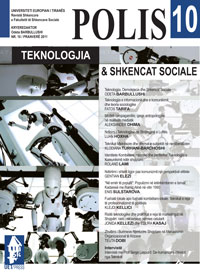Teknologjia e informacionit dhe e komunikimit, dhe teoria sociologjike
Technology of Information and Communications and the Sociological Sciences
Author(s): Fatos TarifaSubject(s): Communication studies, Sociology, ICT Information and Communications Technologies
Published by: Shtëpia botuese “UET Press”
Keywords: sociological sciences; information and communication; technology;
Summary/Abstract: The moral implications of technology and its potential misuse were of deep concern to the classical sociologists. For Marx and Engels technology was basically neutral; everything depends on who controls it. If privately owned, it can be used to gain personal profit while exploiting others. If not privately owned, it can provide humanity with freedom from the drudgery of arduous tasks and freedom to pursue higher and more fulfilling goals. Weber and Simmel (and also later, Foucault) were concerned with the invasion of objective culture, rationalization, and powerful institutional forces into the lives of individuals because of their potential as instruments of control. Durkheim drew a close connection between the level and type of integration in a society. He observed that communities move from those based on kinship and place (mechanical solidarity) to those founded on similarities of interests (organic solidarity), just like Tönnies distinguished between two types of social organization: Gemeinschaft (traditional community) and Gesellschaft (modern society). It is argued that advances in technology can further stimulate sociological thinking and new ideas in the realm of social sciences.
Journal: Polis
- Issue Year: 2011
- Issue No: 10
- Page Range: 9-22
- Page Count: 14
- Language: Albanian

